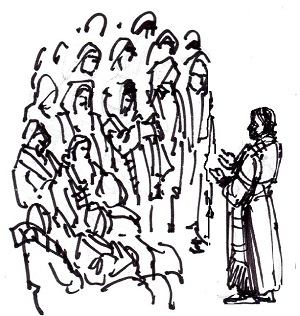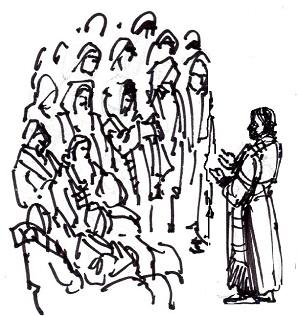

“Woe to you” (Luke 11:42).
Rom 2:1-11; Luke 11:42-46
Today’s Gospel launches us into a blistering attack by Jesus on the Scribes and Pharisees. Caution is advised in reading these passages in historical context and in their thrust within the Gospels, which were composed decades after the time of Jesus and after the catastrophic destruction of Jerusalem and the Temple by the Romans in 70 CE. The war reduced Judaism to a much narrower base of rabbinic Jews, living in diaspora and engaged in polemics with the early followers of Jesus, who fled into the Mediterranean world along the routes Paul had traveled to establish the first Christian communities.
We must understand this history to avoid too simplistic an approach to Jesus’ relationship to the religious establishment of his own day. He was a devout Jew who went to synagogue and observed the major Jewish feasts in Jerusalem. His debates with the scribes and Pharisees do not preclude his respect for their roles and ideas. Vilifying them in subsequent eras led tragically to anti-Semitism and the absurd view that Jesus and the entire first generation of Christians were cut off from their Jewish identity and history.
Having said this, Luke’s Jesus does indeed unload on his critics in today’s Gospel passage. His broadside echoes every other blast uttered in art and history against hypocrites — those people in power who look down on everyone else, who do not practice what they preach, who obsess over small rules while violating the larger commands, who are blinded by pride and corrupted by power and privilege. His harshest criticism is that these leaders have prevented others from finding God and have loaded them down with their own moral scruples without lifting a finger to help them. Jesus finds this —not an evil and unbelieving world -- to be the greatest obstacle to the revolution of the heart he preached and the transformation of the world he offered his life to advance.
There is a Pharisee in all of us. Discipleship challenges us to love that part of us that judges and criticizes others for faults we are often guilty of ourselves. As the saying goes, it takes one to know one. Our path to humility and wholeness begins by acknowledging our own hypocrisy and welcoming the adversary within us back into the embrace of God’s infinite mercy.
Revised from 2013.
Advertisement






